News and views from our community
-
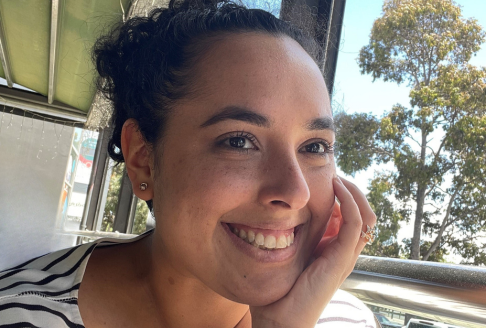
Meet Isabelle Oehler
Isabelle Oehler is a Consultant in our Customer Enquiry Centre. She builds immediate rapport with members of the public and Baptcare customers who ring in with queries or concerns.“Isabelle brings a positive and inclusive energy to our team, doing her best to make everyone feel valued and seen,” says her team leader, Jamie Waiariki.Read on to find out what Isabelle likes about her job, the thinking behind her choice of three dream dinner companions, and why the resurgence of Crocs as a fashion item did not come as a surprise…Isabelle, what does a good day at work look like for you?A good work day includes have a laugh with the customers on the phone, enjoying their conversations and have those satisfying interactions explaining the difference between CHSP and HCP.Which of Baptcare’s WECARE values (Wellbeing, Ethics, Co-creating, Accountability, Respect, Effectiveness) resonate most with you? Wellbeing and Respect. I believe these two values go hand to hand.What sort of work did you do before joining Baptcare?I worked predominantly in retail and at a café as a barista/waitress. However, I have studied Media and Communication, have had the opportunity to work in Public Relations/Event Management and volunteered with various events that help those in need.One of your retail jobs was at the Crocs store in Richmond. Be honest: have you been surprised by the recent resurgence of Crocs as a fashion item?Actually no. With the different collaborations that Crocs have done over the years with other brands such as Hello Kitty they have caught the attention outside of their target market. Therefore, not only are they cute and fun but also provide comfort and practical uses.Now we can see how great you must have been in retail! What did you want to be when you grew up? An artist. I love arts and crafts.Can you tell us something surprising about yourself?My guilty pleasure is reality tv.What is your go-to karaoke song?Whitney Houston, ‘I will always love you’.Do you have a favourite quote or motto in life?Look good, feel good. If you could have dinner with any three people, who would they be?Joe Brumm, Michael Dante DiMartino and Bryan Konietzko. Joe Brumm is the creator of ‘Bluey’ and Michael Dante DiMartino and Bryan Konietzko are the creators of ‘Avatar: The Last Airbender’. I believe both shows are ridiculously smart in their own right. I would love to chat to them about their journey through production, storylines, concept and so on.What do you like most about working at Baptcare?I like working with my team. Everyone is supportive, respectful and understanding. How would your friends describe you?Confident, loving and caring.What would a perfect weekend look like for you?Staying near the beach, watching anime and reality tv, and eating all my favourite food.Lastly, what IS the difference between CHSP and HCP?So glad you asked! It relates to the level of support that you receive from the provider. CHSP (Commonwealth Home Support Program) is the entry-level of support for customers while HCP (Home Care Package) is for customers who have more complex needs. We are always happy to talk people through this, because it can be confusing. We want to make things as clear as we can and help people get the level of support they require.
- 02 Apr 2024
-
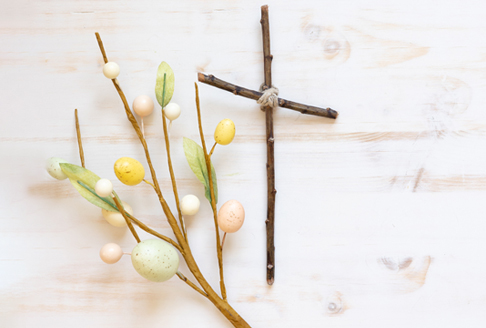
An Easter reflection — by Asher Kirby, Spiritual Care Supervisor, Residential Aged Care
One of my favourite Easter traditions is the Easter Egg Hunt. In my extended family gatherings, the young children are sent into the garden in the afternoon to find hidden chocolate eggs. One year, the egg hiders decided to save time by hiding the eggs early in the day. As the grandchildren ran around discovering lovely shiny foil-wrapped packages, we quickly realised that the day was hotter than anticipated, so the children were collecting foil-wrapped pools of melted chocolate! I love Easter for the holidays, celebrations and traditions (even when they don't go quite as planned). I also love it for the meaning it holds for me as a Christian — the story of the death and resurrection of Jesus. I draw deep meaning from this story, but I also draw meaning from the themes I see in the Easter events that I believe are common to us all. For Christians, Good Friday is a day associated with grief, loss and uncertainty about the future, because it remembers the unexpected death of Jesus. We can all identify with the loss of a loved one, or grief over some aspect of life that has not gone the way we expected it to. We know the feeling of being unsure about the future, and we reach out to others for support. Easter Sunday, by contrast, is for Christians a day connected with hope, celebration and new life, as it commemorates the resurrection of Jesus. For most of us, we can easily identify with these feelings of celebration and new life. We look for hope in our relationships and our work, and we offer hope to one another when we bring all of who we are into those spaces. While each of our experiences is unique, there is commonality in the journey we are on. This Easter, may you find hope and celebration as you go through the weekend, even amidst any grief or uncertainty you are carrying. (And if chocolate eggs are your thing — may yours be non-melted and delicious!)
- 25 Mar 2024
-
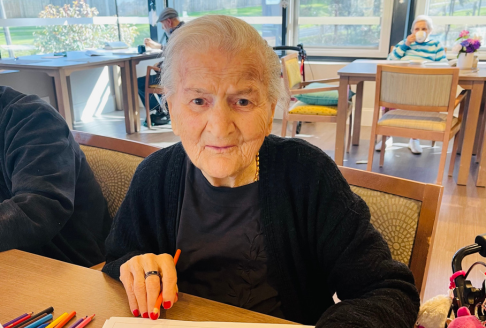
Elpis thriving with Living Well Together approach
Elpis Savidis is one of the most enthusiastic participants in Living Well Together, our Montessori-informed model of care at Baptcare Brookview Residential Aged Care community.
- 20 Mar 2024
-
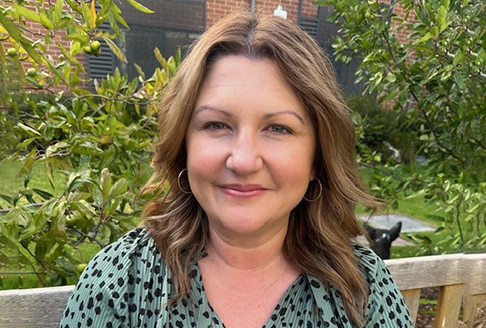
Meet Renee McDonald
Renee McDonald was a minor celebrity within her Communications and Customer Experience team recently when she celebrated 17 years working at Baptcare (or her ‘workaversary’ as she called it) Her inbox was flooded with the warmest testimonials with words like quiet achiever, caring, empathetic, professional and humble being used time and time again. We had the pleasure of sitting down with Renee to witness these qualities firsthand and hear more about her personal and Baptcare journey. You have worked at Baptcare for 17 years. Firstly, congratulations and secondly, the question everyone has on their lips, what are the main reasons you’ve stayed at Baptcare? Fun and variety. I also get the chance to help people which I really enjoy.I also am very proud of being a part of a company that makes a positive difference to a variety of different groups in society. You’ve had a range of roles over your years, starting as a Support Co-ordinator before moving to Office Manager and Retirement Living Co-ordinator roles. You’re currently the Client Relationship Partner in residential aged care sales. How have you found the variety of roles you’ve done at Baptcare and has this variety been a factor? Well, I first started at Baptcare on a short-term part-time contact covering for the Long Service Leave of one of the receptionists. Fortunately for me when she returned from her leave she wanted to cut back one of her days and there was also a vacancy in the lifestyle department so I was able to work in admin and lifestyle.I started working at Strathalan when I had small children and feel so lucky that I found a place that was understanding and supportive of working mothers and I was able to work part-time and job share when my boys were young. As my children got older and I was able to take on more challenging roles, I was very fortunate with the opportunities that came up at Strathalan as the site also developed and grew. I worked as Roster Clerk and Program Co-ordinator for the Strathalan Volunteer Program before moving into Retirement Living Support Coordinator role.I would definitely say that being able to grow and experience different roles has been a major factor in me staying with Baptcare.Have you noticed any major changes in Baptcare/working life over the past 17 years? Baptcare has changed a lot in the 17 years that I have worked here! But I think the heart is still the same What is your current role and what does it involve day to day? I am currently working as Client Relationship Partner based at Strathalan. I get to showcase our Residential Aged Care services and help people and their families access the best aged care they possibly can.What do you like about working with Baptcare and in the Client Relationship space? Baptcare and in particular Strathalan has been a massive part of my life for the past 17 years. The people who live at Strathalan and the amazing people I get to work with – it is more than just work, it is a family. There are many co-workers and a number of residents who I have worked with for a large part of my 17 years if not all of it.I’m also very proud to be part of the sales team! Although we are all spread across Baptcare sites I feel as supported and connected to them as I do the people I am physically with every day.What would you say to someone thinking of joining Baptcare? Do it Can you share a particularly special work day/customer interaction you’ve had recently? I couldn’t pick just one because there are a lot of these! One of the best parts of working here is being able to interact with the people we care for and help to make a positive difference in their day.Did you always want to work within the caring space and what are some other jobs you’ve performed in your career? I am very much a person who likes to help others and look after people but before coming to Baptcare I had worked mainly in administrative roles in different industries. I had three out of my four grandparents needing to go into aged care and when I saw the ad in the local paper 17 years ago I thought, ‘Yes – that’s somewhere I would like to work’.What was your first job ever? My first ever job was an administration traineeship at the Fire Brigade Training College in the community safety department. Lots of phone calls about beeping smoke alarms.What did you want to be when you grew up? Oh, lots of different things! I still haven’t decided though!Can you tell us 2 surprising things about yourself? I’m scared of birds (probably not surprising to those that know me).We cheekily suggested to Renee that we could photoshop some birds into her Faces of Baptcare photo if she’d like and got the following response:Haha yes! Photoshop birds in, that would be hilarious! The photo is taken in the Strathalan garden area and as you walk out the door there is a sign that says ‘caution swooping birds’. I feel like I’m taking my life into my own hands every time I walk out there.What was the last thing you watched and read? The Well-Lived Life by Dr Gladys McGarey and who can miss the car wreck TV that is Married at First Sight (MAFS)!What would your favourite weekend involve?My favourite weekend would include a walk near a body of water with my dogs and time with my gorgeous family.What are two things on your bucket list? I would love to travel through Europe and also travel to Mexico.Do you have a mentor or idol? OR If you could sit next to someone at a dinner party, who would it be and why? Oh, this is a tough one. Definitely in my working life at Baptcare I’ve had the pleasure of working with and learning form the great leaders we have! What would be interesting would be to sit with the group of Baptist ladies that had the vision that started Baptcare all those years ago when they bought a farmhouse and property in Macleod and hear what they think of us now.Thanks Renee. Something tells us that those ladies would be delighted to sit down with you too and would the first to applaud your amazing contributions to Baptcare. Here’s to the next 17+ years…
- 20 Mar 2024
-
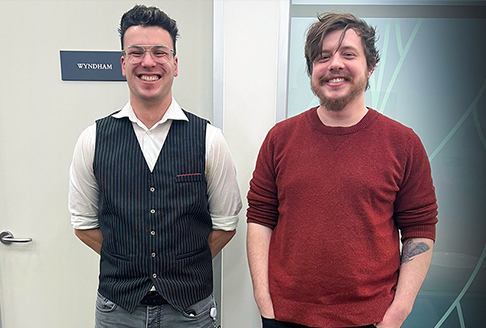
World Social Work Day – Meet Michael and James
What are your current roles?Until recently when I moved to the Kinship Care area, James and I had worked together for nearly two years in the Targeted Care Package (TCP) space. TCP provides intensive case management for young people in out of home care who are at risk of entering residential care.Can you please explain out of home care versus residential care?Out of home care is a young person, 0-18 years old, living in a placement away from their biological parents. This could be a kinship placement with a family member such as a grandparent or aunt, for example.Residential care is a young person living in a community home, being cared for by support staff. This residence is shared with other young people who are supported by services on a 24/7 basis.How long have you been working at Baptcare?Michael: September 2021 James: August 2022Can you tell us more about the Targeted Care Package (TCP) space and what your jobs involve day by day?The TCP is a smaller team in the Baptcare Victoria Family and Community Services (FACS) space and is quite a niche program in the Department of Families, Fairness and Housing (DFFH). We work closely with child protection to provide support to the young people and their family to ensure children are supported to stay at home. We sit on smaller case loads and visit the client once a week and the work is intensive.A typical day at TCP entails engaging with clients, some of whom are at high risk. Thus, it's common for us to proactively address their immediate safety concerns. We also adapt to various challenging situations, such as when a child reveals abuse or exhibits behaviours indicating potential risk. In such cases, we collaborate closely with their extensive care teams to orchestrate a suitable, effective and timely response.TCP consistently keeps us alert, as each day brings unpredictable situations. However, the gratification stems from our close collaboration with clients, offering profound insight into their lives and requirements. We're often commended for making seemingly impossible feats a reality.What do you like about working with Baptcare and in the FACS space? Michael: The cohesive and welcoming friendly culture at the Sunshine office truly sets it apart. It's not just a great team and community, but an environment where everyone works together seamlessly. The Sunshine office embodies this spirit, making it a wonderful space to work in. And of course, the sweet biscuit tin adds an extra touch of warmth to our collaborative atmosphere.James: I enjoy it when the snack bowl is stocked with Mentos. On a different topic, the office environment is fantastic. The team fosters a welcoming atmosphere, and there's a sense of camaraderie among everyone. Lunchtimes are particularly enjoyable because you never know who you'll end up chatting with, but you can always count on it being an interesting conversation.It’s World Social Work Day – what is one thing you’d both like to change in society if you had a magic wand?Michael: I would make V/Line trains actually run on time. In terms of social work, I would like unlimited funding and a much-needed update for the DFFH CRIS and CRISSP*.*Ed. the CRIS (Client Relationship Information System) and CRISSP (Client Relationship Information System for Service Providers) are the client information and case management systems designed to improve services and facilitate the provision of coordinated care of DFFH clients.James: This is a tricky one as I would probably want spiders to be the size of cats but less deadly so we could keep them as pets, especially jumping spiders, but I suspect most people would disagree with this. So, I would probably like to change society’s attitudes to mental health issues and make it socially acceptable for people to talk about and seek help for themselves.Can you share a particularly special work day/customer interaction you’ve had recently?Michael: for me it was not long ago when a client I had worked with for maybe two years ago turned 18. We closed with the family. To see all the growth and how far he had come in a short time was heartwarming. The placement was close to breaking down when I came on board. When the time came to an end, he was closer with his grandmother and had a plan to enter a mechanical apprenticeship all lined up for next term. It was hard to say goodbye to him and his carer but I knew he was on the right track.James: this is a random one but through a strange series of events I ended up meeting a past client and we caught up. It was so nice to see what an accomplished adult she had become.Can we just ask what you mean when you say “we closed with the family”?Young people are no longer under child protection care when they reach 18 years of age. Unfortunately, that means we can no longer provide services to our clients. So, when we close a case with a client it means we stop working with them and follow the “closing process”. This usually involves doing all we can to ensure they are set up for the best possible future without us. This could mean setting up Better Futures (a less intensive case management service for people aged over 18 years) or any other relevant supports and finalising our service with the family.Did you always want to work within the Family and Community Services (FACS) space? If not, what drew you to your line of work - and what are some other jobs you’ve performed in your career?Michael: Honestly, I had no idea this line of work existed when I left university. I went into my Bachelor degree in Health Sciences with no idea where I was going to end up. I fell into youth work and wanted to continue to grow in the field. I got a job in workers compensation case management after youth work and realised I needed to go back to working with youth. IT WAS NOT FOR ME! TCP Baptcare saved me when they accepted my application. I also worked as a waiter and at McDonalds through university. Hospitality is way more stressful than you think! Its way more stressful than family services.James: Similar to Michael, I didn’t know this area really existed, but I knew I wanted to work with teens; they are such a strange and interesting demographic to work with. On one hand they can be incredibly challenging but on the other, they can surprise you with just how much they are capable of with the right amount of support. But to be honest, I have mostly worked in administrative roles prior to this industry, and as anyone who has met me in person would agree, that is not my strong suit.What did you want to be when you grew up?Michael: A dinosaur (still do) Velociraptor or Allosaurus. Yes, T-Rex was bigger but we all know who had the brains behind the operations.James: An Astronomer because I’ve always been interested in space and I always had the mathematics background. It was a last-minute gut instinct that made me switch my preferences to a psychology degree.Can you tell us two surprising things about yourself?Michael:I can make 2-minute noodles in 1 minute and 52 seconds.During Covid, I attempted watch repair and blacksmithing. I was not successful.James:Surprisingly, I do not have a black belt in: Karate, Jujitsu, Tae Kwan do, Maui Tai, Ninjitsu, Aikedio, Krav Maga, Kick boxing and tennis.My top genre on Spotify is country music.Please complete this question: my favourite weekend would include …Michael: Time spent with my puppies, Noodle (Shetland Sheepdog) and Ducky (Corgi) and some time to go surfing.James: Pottery classes (this is actually legitimate) and watching horror movies.What are two things on your bucket list?Michael:to learn the difference between “affect” and “effect.” I have googled this and still don’t quite comprehend the differences.See the northern lights.James:Live with a Doberman (you don’t own them they are like roommates).Run my own art exhibition.What is the last thing you watched and/or read?Michael: The Wikipedia page on the Emu War. Did you know they’re going to make a musical about it!?James: I am currently reading a horror novel, “Exquisite Corpse” by Poppy Z Brite and I’m re-watching “Avatar the Last Airbender” (the original not the remake).Do you have a mentor or idol? OR, if you could sit next to someone at a dinner party, who would it be and why?Michael: I would like to sit next to the two guys who made the TV series “Come Fly With Me” and beg them to make another season.James: Probably the judges on “Drag Race” - I need fashion advice.One last question relating to your working relationship.You seem to have a great working relationship. What do you like most about each other - what are each other’s superpowers - and what do like about working together? Michael: James is a very considerate worker. James is very selfless as a co-worker and is the first to support his team when things need to be done. James is very therapeutic in his works and goes above and beyond for his clients. James will form completely wild scenarios to attempt to solve obstacles when working with a TCP case that some people might say: this almost borders on crazy conspiracy theories.His superpower is knowing completely useless information in depth.What I liked most about working with James was he could lift the team’s spirits no matter what circumstances.He will playfully disagree with someone’s point of view on purpose just to create debate. For example, if you said you liked pineapple on pizza, James would argue that pineapple on pizza is the worst, even though he enjoys pineapple on pizza, just so he can stir up the other person. This is quite enjoyable to watch as an outsider.Since I’ve changed roles within Baptcare FACS, James hasn’t been the same without me.James: Michael is probably one of the best co-workers I have ever had. It helps that he knows everything possible about the role but his biggest strength is that he is always willing to share that knowledge no matter how many times I ask him how to find the same document.Michael is also excellent with all his clients. I won’t say who, but two of his clients recently started crying when they found out he was moving to a new role, at least I hope this was the reason and not that they realised that they would now just be stuck with me.Michael’s superpower would be the ability to run twice as fast as a V/Line train so that he would have more time for his dogs at home.The best part about working with Michael was feeling as though you always had someone on your side who you could trust to point you in the right direction when you need it, even if he does sometimes have to talk me down for some of my more outlandish theories.On a personal level, what I really like most about Michael is how you can have really intelligent discussions about pretty much anything and he will hear you out and give you a genuinely good conversation, even if the topic is something insane, (like how big an animal do you think you could take in a one on one fight?).As Michael said, he has changed roles and it hasn’t been the same but he’s still a joy to see in the office.
- 15 Mar 2024
-
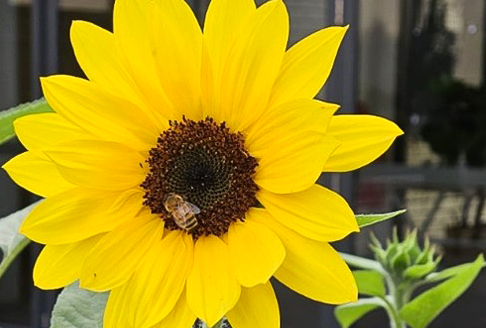
Let’s do some digging into Project GROW
Gardening program Project GROW is in full bloom across Baptcare’s Residential Aged Care communities and community day centre programs. We chatted with the creator of Project GROW, Quality Business Partner Kate Flight, about her vision for the project and how that vision is playing out within our communities. Can you tell us a bit about Project GROW?Project GROW is a 2024 initiative that promotes time outdoors, increased physical activity and being active in the garden.Part of the project has been designed to encourage greater use of our outdoor spaces so even happy hour and some exercise groups can occur outside rather than same room each time indoors.Project GROW encourages our residential aged care and day centre communities to be active in the garden, growing seeds, cuttings or plants to enhance spaces both in and outside while enjoying the many benefits that being in nature provides. It has been wonderful to see how all our different aged care communities have embraced the project, whether by actual physical gardening, enjoying some home-grown crops, decorating some garden spaces or enjoying more activities in our outdoor spaces.I feel that the tagline #growingtogether sums the initiative up nicely as it refers to the growing together as a community, as well as the obvious plant reference. It is so wonderful to see how our residents are enjoying the collaboration between our aged care community sites and getting to know the Baptcare community within their home and outside.Who is involved in Project GROW?All 16 Residential Aged Care (RAC) sites are actively involved in Project GROW and our Retirement Living and Day Centre communities are dusting off their gardening gloves to join in the fun soon too!What are some of the design aims of Project GROW?It has been designed to create further opportunities:for participation and co-designto strengthen partnerships with local communitiesto improve health and wellbeing gained through outdoor activity, social engagement and multi-sensory activitiesto showcase the stories, talent, skills and creativity of our Baptcare communityto connect residents, staff, families and volunteersHow are things going with Project Grow? It’s going so well! There have been so many positive outcomes such as:Opportunities to learn new skillsInstallation and planting of raised garden bedsRe-designing of courtyards to create more inviting spacesResidential Aged Care site connection: The resident committee meets up (currently fortnightly) to share their progress, discuss their plans and highlights. It’s been a great way to share ideas and inspire othersExtra involvement of the Resident committees as they work towards Baptcare’s Biggest Garden Party – a collection of garden parties to be held at each site for 10 days from April 15. The Resident committees have been co-designing their own garden parties and residents at each site have chosen the menu to celebrate the project‘Grass is greener’ competition, with sunflower seeds planted simultaneously. There are now three sites with sunflowers blooming while the other sites wait in anticipation. Our tallest sunflower to date is 151cm (See amazing photos below)Paddock to plate – some residents enjoying corn on the cob fresh from the garden – of course with lashings of butter. A great collaboration with lifestyle and catering teams to plant, grow and eat straight from the garden. Other sites have enjoyed fresh tomatoes or some herb sconesTable decorations – for those less mobile – residents have come together potting succulents and propagating plants for new table arrangementsPropagation station – e.g. Karingal have a table set up with various plants to see which ones work best from cuttings. Includes some garlic cloves that are plantedFor the non -gardeners, painting and decorating has been a big part of Project GROW. Park benches have been redecorated, garden ornaments have been brightened upHans and Shirley from Abbey Gardens RACTreasure hunts – increasing physical activity – finding some (newly painted) hidden treasures in the garden while out on walksFor those less mobile – residents are being supported with 1:1 activity in their room or residents are creating small plants to take to their rooms so they can also be part of project GROWBird baths, bird houses, worm farms have been added to some sitesSharing all our gardening tips to make a sharable resourceSome great watering help from our Coasthaven (above) Wattle Grove residents.How are the staff finding Project GROW?Our Lifestyle Co-ordinators have been amazing with the project and often share lovely feedback such as Kate’s insights below.Kate Jeremiah, Lifestyle Co-ordinator, Heritage ManorProject GROW has been a really great project to work on with our residents. Our residents and staff are able to collaborate informally and for those who aren't very engaged this can really help them feel comfortable without being overwhelmed by noise or crowds.Whether it’s a walk in the garden or sitting making flowers in Art or even driving around in the bus looking at gardens around our area, everyone has really taken to the theme of the project.Our Sunflower Garden is a very hot topic at the moment, generating lots of conversation opportunities. The men at our home are the most interested. The garden bed has become a meeting point for the blokes to stand around and compare tips. I often have three or four of them coming to report to me daily, telling me the plants need a drink or a bit of TLC. We are finally starting to see some flower buds!One particular resident, Anne (see photo) who has spent most of her time here in her room, has started coming out to sit in the garden, water the plants and enjoy the sunshine which has led to her now coming to our Coffee Club to socialise with others. A really great result!Wattle Grove have even set up a display board (below) for everyone to share the Project GROW journey.How does Project GROW link in with our Living Well Together model of care?Project GROW was introduced to support our Living Well Together model of care. Project GROW promotes person-centred care and meaningful engagement. It is not just for the green thumbs but can be inclusive of all our residents. It is great to watch families and staff also sharing cuttings and their tips to create some great gardens and special memories.You can read more about our Living Well Together model of care on our website:https://www.baptcare.org.au/why-baptcare/news/living-well-together-launched-at-strathalan-residential-aged-care-communityThanks Kate. We look forward to seeing the photos of Baptcare’s Biggest Garden Party soon!
- 15 Mar 2024
-
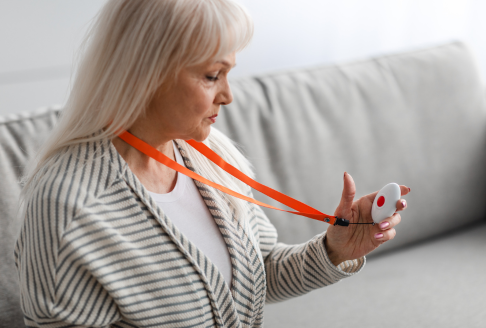
Personal Alert Victoria | Enhancing safety and independence
Personal Alert Victoria (PAV) offers eligible Victorians a free personal monitoring and emergency response service. This important service is funded by the Victorian Government and helps people continue to live independently at home, safe in the knowledge that help is only a button press away.If you or someone you know is frail, elderly and isolated or who is living with a disability, you may like to consider applying for the PAV program.What does the PAV service involve?The PAV service responds to calls for assistance 24 hours per day.Clients wear a pendant around their neck or wrist which is designed with a button that, when pressed, dials the PAV hotline connecting the caller with trained staff ready to provide assistance. For example, if you fall or suddenly feel unwell, you can press the button and be connected with someone who can speak with you through the pendant.PAV hotline staff will talk with you to determine whether a call should be placed with emergency services, one of your nominated contacts (usually family members, friends or neighbours) or whether you simply require some reassurance about your situation (in the event of a non-urgent issue).How does my pendant connect me to the PAV hotline?A receiver unit sits next to your telephone and is plugged into your telephone line. When it receives an alert from your pendant (after you have pressed the button), the receiver unit automatically dials the PAV hotline.Who is eligible for the PAV service?Eligibility is determined via an assessment conducted in your own home.There are two sets of eligibility criteria to meet – Part A and Part B:Part A:You must meet all three conditions set out below –Daily monitoring – you consent to daily monitoring.Wearable pendant - you are capable of using and willing to wear the PAV pendant at all times.Living situation – you live alone OR are alone for most of the day or evening OR live with a person who would be unable to get to the phone in an emergency (or is unable to use the phone).Part B:You must meet two of these criteria –You have had at least one fall that needed medical attention in the previous six months or be at risk of falls.You suffer from a major medical or chronic condition that puts you at risk of medical emergencies or has some ongoing effect on your health or wellbeing.You are taking six or more different medications on a permanent basis that are prescribed by your doctor / medical specialist.Who conducts my eligibility assessment for PAV?Eligibility assessments for the PAV service are usually conducted by your local council, community health service, aged care assessment service, district nursing service and some publicly funded community rehabilitation services.You can either contact your local service provider directly (for example, by enquiring with your local council’s aged care program) or be referred to an assessment service by your doctor or local community health service.It’s worth noting that there may be a waiting period involved until a PAV unit becomes available for installation at your home.For more detailed information on the PAV program, please refer to the PAV program and service guidelines provided by the Victorian Department of Health.
- 13 Mar 2024
-
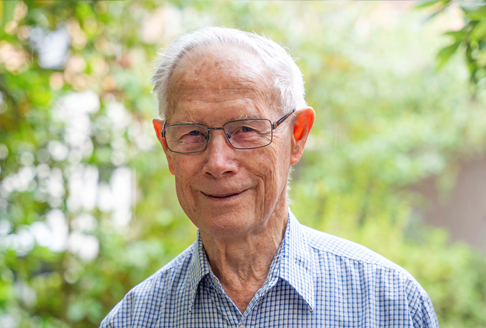
Gentleman Jim makes a difference by lifting others at Karana
If you look up ‘Gentleman’ in the encyclopaedia, don’t be surprised if it has a photo of Jim Allinson.A much-loved member of Baptcare’s Karana residential aged care community, Jim has a caring word or action for every resident or staff member he encounters.“Treating people well is important,” he says. “We need to look after each other.”Although born in Elsternwick, Jim lived in a string of country towns as a child. His father was posted to different schools as a Maths, Science and Agriculture teacher, but Jim was not so enamoured of the classroom.“I wasn’t a very good student,” he recalls. “All I wanted to do was get to the weekend when I would go out to farms and ‘help’, in inverted commas.”At the age of 15 he left school in Shepparton to assist in running his Uncle Bill’s dairy farm near Cobram. However his father insisted that if he was successful in gaining entry to the agricultural college at Dookie, he must enrol.That is what happened. Jim describes his time at Dookie College as three of the best years of his life. In his final year he was College Captain.He developed an interest in soil and land use which led to employment with the newly-established Soil Conservation Authority. For the next 25 years he travelled all around Victoria, working on erosion, land management and related issues.“At that time there was a high percentage of farmers not treating the soil resource well, but there have been tremendous changes in understandings and actions around ecology and agriculture since then,” he says.Farmers, shire engineers and other land users sought advice on control and prevention of soil erosion and improvement of land productivity. Jim served in senior management positions with the Soil Conservation Authority and the National Parks Service.He also worked overseas on land management improvement with the Food and Agriculture Organisation of the United Nations. During a posting north-east of Cairo, working between Mersah Matruh and the Siwa Oasis, Jim focussed on land management improvement while his wife Mary – a Home Economist – worked with a young female Bedouin Land Management graduate on helping women improve family nutrition and child development within their desert living conditions.On returning to Australia, Jim taught Land Management at Ballarat University College, as well as engaging in further overseas work in the Cook Islands and Zimbabwe.Through it all, Mary McDonald from Shepparton was by his side.They first knew each other through being in the same remedial maths class at Shepparton High School. They had a long and happy marriage and have three children. Jim was Mary’s carer for the last decade of her life.“Of course I wish Mary was still here, but I’m proud to say that if I could choose any three people to be with, it would be my children. I just love them and I love being with them.“We booked Mary into Respite Care at Karana. When we saw how well staff cared for you, we changed to permanent, and I booked in full time too. That was over three years ago, and I am so glad and grateful to be one of the Karana family.”Karana community members love being with Jim, too, because of the way he is always on hand for an encouraging word or to help out.“I call Jim the Cary Grant of the home,” says Bryan Mooney, Baptcare’s Volunteer Program Specialist. “He is a true delight and in truth a bit of a role model for me. I asked his advice on how to be the best husband to my beautiful wife just before I got married.”“I enjoy living here very much,” Jim says. “The Karana staff are just marvellous. You hear stories about places that don’t have good staff, but it’s the reverse here, with their dedication and the high quality of their care. These are such thoughtful, caring people.”Which is of course a perfect description of you too, Jim.
- 08 Mar 2024
-

Communicating with someone who is hard of hearing – tips for better connection
Communication is central to feeling understood and connected to those around us. But for people experiencing hearing loss, even everyday conversations can feel challenging and lead to feelings of isolation.Simple interactions, such as going out shopping or heading to a café for a catch up, can seem daunting when background noise intrudes on simple conversations, making it difficult to hear what is being said. People experiencing hearing loss can feel awkward about continually asking someone to repeat themselves or fear that they may be misunderstanding the conversation completely. This can cause them to retreat from social outings to avoid feeling uncomfortable.Whether you are interacting with a family member, friend or co-worker, the strategies outlined below can make a difference in fostering better understanding and connection.Please note that these tips are most helpful for people with mild to moderate hearing loss. People experiencing profound hearing loss or those who are Deaf have very different needs – please contact your local Deaf awareness society for more details.Choose the right environment – lighting can make a big differencePeople with hearing loss often rely on visual cues, such as lip reading, facial expressions and gestures to assist with understanding what you are saying. So, it’s best to avoid dimly lit rooms or areas with heavy shadows to make it easy to see everyone’s faces.Another important consideration is to choose a setting without excessive background noise. Crowded restaurants, cafes and venues with loud music will make it hard for the person experiencing hearing loss to focus on the conversation at hand due to sound distortion issues. If you are at home, consider turning off the television or radio to limit background noise.Adjust your speaking style – make sure you face the personBefore starting the conversation, make sure you have the person’s attention – say their name or consider waving towards them to indicate you want to tell them something.Remember to position yourself so that your face is visible to the person with hearing loss. Avoid speaking when your back is turned and remember not to cover your mouth. Some people with hearing loss may hear better in one ear than the other, so adjust your position and speak more towards their preferred ear.Speak clearly and slowly to help with comprehension. If you are in a group, avoid speaking over the top of other people, as it can be hard for someone experiencing hearing difficulties to follow the conversation.Conversation etiquette – remain patient and flexible in your styleAvoid speaking too loudly or shouting at the person – for some people experiencing hearing loss, this can distort the words and lead to even more trouble understanding what is being said.Consider rephrasing your words or even write down important details, for example, appointment times and locations, so that they are not misunderstood.Don’t give up and say things like ‘it’s not important’ and walk away. This can add to feelings of isolation for those experiencing hearing loss.Provide choice – offer to meet someone at their preferred locationIf you want to go out for social reasons, consider asking the person with hearing loss where they would prefer to meet you. This empowers them to suggest a familiar location with low background noise that can help them hear you much better.In summary, if we can all make some gentle adjustments to the way we communicate with someone who is hard of hearing and try to follow these simple tips, we can help create a more inclusive and understanding environment for people with all levels of hearing.
- 01 Mar 2024
